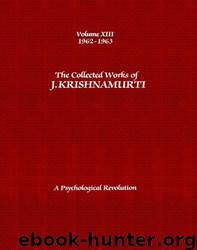Collected Works 13 - A Psychological Revolution by Jiddu Krishnamurti

Author:Jiddu Krishnamurti [Krishnamurti, Jiddu]
Language: eng
Format: epub
Published: 0101-01-01T00:00:00+00:00
LONDON 2ND PUBLIC TALK 7TH JUNE 1962
This evening I would like to talk about fear, sorrow, and innocency.
We all have many experiences, and every experience leaves a mark; every thought, every influence shapes our minds in a certain way. And it is essential to die to everything we have known, so that the mind is young, fresh and innocent. Only an innocent mind, a mind which, though it has lived through a thousand experiences, is dead to the past - only such a mind can perceive what is true and go beyond the things put together by man. And fear, it seems to me, is one of the corruptive and destructive forces that make this innocency impossible.
Fear is psychological time. There is no fear if you have no psychological time at all. If there is no tomorrow into which you arc moving, and no looking back, every form of fear ceases. Fear comes into being when thought projects itself into the future, or compares itself with what it has been in the past. Psychologically, time is thought, both conscious and unconscious; and it is thought that creates fear.
We have every kind of fear: fear of death, fear of being ill, fear of old age, fear of losing the satisfactions we have known, fear of public opinion, of not fulfilling, of not being a success, of being a nobody. Being afraid, we seek various escapes, outwardly as well ; as inwardly; and, for most of us religion has become an extraordinary escape from fear. To understand fear, one must understand the whole process of thinking, the whole mechanism of thought.
As I pointed out the other day, it is important to listen to what is being said, without either agreeing or disagreeing; because we are dealing, not with ideas but with facts. We are dealing with facts, regardless of whether those facts are agreeable or unpleasant. And if we are able to look at the fact of fear, listen to the whole content of it, see the structure of it, then I am quite certain that the mind will instantly be free of fear.
But we do not know how to listen, because we are always trying to run away from fear; we want to resolve it, we want to discover a way out of it, we want to find its cause. We name the fact `fear', and then the word becomes all important; so we never listen to the fact.
Finding the cause of fear is not freedom from fear. After a great deal of analysis, inquiry, one may know the cause of fear; but at the end of it one is still afraid. And without really being free of fear, every form of search, every form of inquiry only brings about further illusion or distortion. A truly religious man, if I may use that word, has no fear psychologically, inwardly. By a religious man I mean a total man, not one who is merely sentimental or escapes from the world by drugging himself with ideas, illusions, visions.
Download
This site does not store any files on its server. We only index and link to content provided by other sites. Please contact the content providers to delete copyright contents if any and email us, we'll remove relevant links or contents immediately.
Professional Troublemaker by Luvvie Ajayi Jones(29648)
Whiskey Words & a Shovel I by r.h. Sin(19388)
Rewire Your Anxious Brain by Catherine M. Pittman(18640)
Healthy Aging For Dummies by Brent Agin & Sharon Perkins RN(17035)
Cat's cradle by Kurt Vonnegut(15328)
Talking to Strangers by Malcolm Gladwell(13344)
The Art of Thinking Clearly by Rolf Dobelli(10446)
They Both Die at the End by Adam Silvera(9804)
The 5 Love Languages: The Secret to Love That Lasts by Gary Chapman(9782)
Doing It: Let's Talk About Sex... by Hannah Witton(9275)
The Compound Effect by Darren Hardy(8941)
Thirteen Reasons Why by Jay Asher(8887)
Goodbye, Things by Fumio Sasaki(8574)
Wonder by R.J. Palacio(8569)
Tools of Titans by Timothy Ferriss(8363)
Atomic Habits: Tiny Changes, Remarkable Results by James Clear(8319)
Becoming Supernatural by Dr. Joe Dispenza(8196)
Wonder by R. J. Palacio(8097)
Change Your Questions, Change Your Life by Marilee Adams(7753)
